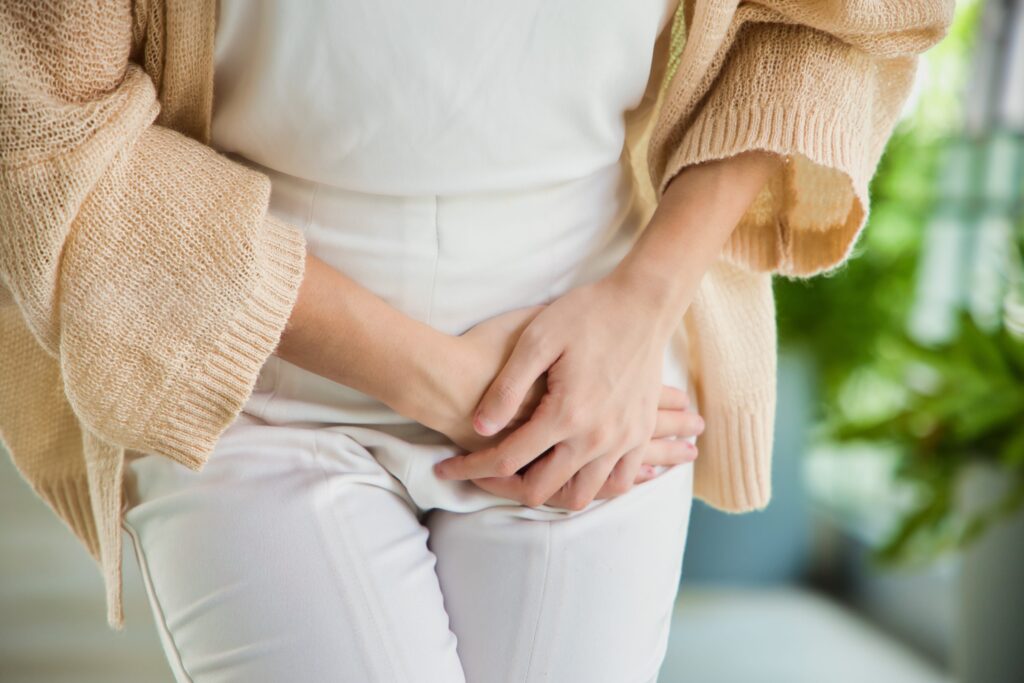A Closer Look at Incontinence and the Latest Treatments
Posted By:
Dr. Michael Coyle, DO FACOOG, FPMRS

Bladder and bowel incontinence are very common conditions that affect people of all ages, but women can be more likely to struggle with these disrupting conditions. Incontinence can be brought on by childbirth, hormonal changes, menopause and several other common things a woman may go through in life. Thankfully, several treatments exist, including surgical and non-surgical options. The best path to effective symptom management with any type of incontinence is to gain a good understanding of the condition and obtain the best diagnosis.
Understanding Incontinence
Incontinence is the involuntary loss of control over bodily functions, leading to unintentional leakage of urine or stool. This condition can affect various aspects of daily life and is categorized into different types based on the nature and cause of the loss of control.
Bladder Incontinence
Bladder incontinence is the involuntary loss of urine, but there are several different types, including:
- Stress Incontinence: Leakage caused by pressure on the bladder, often due to coughing, sneezing or lifting.
- Urge Incontinence: A sudden, intense urge to urinate, followed by involuntary loss of urine.
- Overflow Incontinence: The bladder cannot empty fully, leading to dribbling.
- Functional Incontinence: Inability to reach the bathroom in time due to physical or cognitive limitations.
- Mixed Incontinence: Combination of stress and urge incontinence.
Weak pelvic floor muscles, aging, childbirth, neurological disorders and urinary tract infections can all contribute to urinary incontinence.
Bowel Incontinence
Bowel incontinence (also known as fecal incontinence) is the involuntary loss of stool, mucus or gas. Much like urinary incontinence, several types exist:
- Urge Incontinence: Inability to control the sudden urge to defecate; inability to “hold back” before reaching a bathroom.
- Passive Incontinence: Stool leaks without awareness, frequently when passing gas.
- Overflow Incontinence: Constipation causes leakage around the stool blockage.
Muscle or nerve damage (often due to childbirth), chronic constipation, diarrhea, rectal surgery and neurological disorders can all be underlying factors in bowel incontinence.
Common Causes of Incontinence
Incontinence can result from various factors, including aging, which weakens muscles and tissues. Childbirth can strain or damage the pelvic floor muscles, while surgery might impact bladder or bowel control. Obesity, neurological disorders and chronic diseases can also contribute by affecting the nerves and muscles involved in bladder and bowel function. In many cases, more than one factor can be involved in all types of incontinence.
Diagnosing Incontinence
Before discussing treatments for urinary or bowel incontinence, the best physicians will complete a thorough diagnostic process to understand the condition and potential causes of your incontinence. Therefore, a review of your medical history, a physical exam and even special tests like urinalysis, urine output measurements or fecal testing may be required.
Contact the Coyle Institute at 850-637-8258 for a consultation.
Non-Surgical Treatment Options
Non-surgical treatment options are most often recommended, and these can be highly effective for some types of mild incontinence. For example, physical therapy and pelvic floor exercises are known to be effective for urinary incontinence after childbirth.
Dietary changes can also significantly and positively impact some women, as certain foods, such as artificial sweeteners, sugar, certain spices and carbonated drinks, can directly cause incontinence for some individuals. Likewise, losing weight and maintaining a more active lifestyle can help.
Medications, such as topical estrogen or anticholinergics, may be recommended for urinary incontinence. At the same time, anti-diarrheal drugs like loperamide may be suitable for mild bowel incontinence.
Surgical Treatments and Implantable Devices
Surgical options for managing incontinence are also available for patients with more severe issues. These can include procedures like sling surgeries and bladder neck suspensions that support the urinary tract and reduce leakage.
Advanced implantable devices, such as sacral nerve stimulators, help regulate bladder and bowel function by sending electrical impulses to the nerves controlling the bladder and rectum. Artificial urinary sphincters, which mimic the function of a healthy sphincter to prevent leakage, are also sometimes used to provide control over urine flow.
Emerging Technologies in Incontinence Care
Several new treatments and technologies are being explored for incontinence care, and at the Coyle Institute, we closely follow and utilize these advanced options to help our patients regain control of their symptoms. For example, we offer Botox for bladder dysfunction and the O-Shot, which have both proven to be highly effective for some women dealing with urinary incontinence.
We are also proud to offer another advanced treatment, the InterStim Therapy device, as an FDA-approved option for bowel incontinence. This tiny implantable neurotransmitter helps manage bowel control by sending impulses between the bowels and the brain.
Living with Incontinence: Tips for Daily Management
Managing both bladder and bowel incontinence daily involves practical strategies to maintain comfort and minimize disruption:
- Use absorbent products like pads or protective underwear to manage leakage and stay dry.
- Maintain good hygiene and use barrier creams to prevent skin irritation.
- Follow a healthy diet, stay hydrated and plan bathroom visits when away from home.
- Strengthen pelvic muscles through exercises like Kegels to improve control.
- Implement scheduled bathroom breaks to increase bladder and bowel control gradually.
- Avoid irritants such as caffeine and alcohol that can affect bladder function and bowel health.
- Engage in regular physical activity to support overall health and improve incontinence management.
The Coyle Institute’s Approach to Incontinence
At the Coyle Institute, we provide personalized and compassionate care with a holistic approach. Our patient-focused treatment plans are tailored to each individual’s needs, and Dr. Coyle focuses on utilizing the latest emerging treatments to ensure effective management of incontinence.
Taking Control of Incontinence Starts with a Consultation
Though challenging, incontinence issues can be managed effectively with the right approach and resources. You don’t have to continue to suffer, as many women find drastic improvements with the right treatments. If you struggle with incontinence, reach out to the Coyle Institute at 850-637-8258 for a consultation to explore treatment options and find the best level of support.

